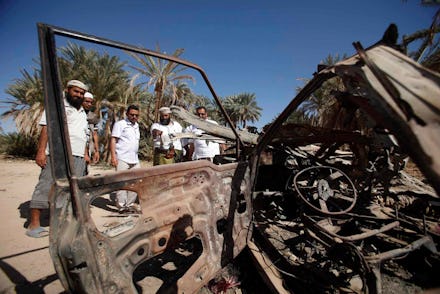What I Was Doing When a Drone Killed 13 People in Yemen

On Thursday, a U.S. drone strike hit a convoy that was headed to a wedding party in a central region of Yemen, killing at least 13 people. Reports indicate that the drone operators mistook the group for an Al Qaeda convoy, although the New York Times stated that some of the dead may have, in fact, been linked to Al Qaeda.
Meanwhile, from thousands of miles away, I passively noted this incident, which appeared as a New York Times alert at the top of my iPad screen. For a brief few seconds, it distracted my attention while I was plowing through yet another episode of Breaking Bad on Netflix. Then it disappeared.
I don't like to read about drone killings. The stories are often uncomfortably gruesome: villagers picking through charred limbs and still-burning scraps of metal in the road. I don't want to visualize the crying children, the smell of gasoline, the stunned loved ones. It's much easier to let these stories slip, grab a coffee, and get on with my day.
My biggest concern about drones has nothing to do with the aircraft themselves, which are little more than tools that can detect heat signatures and deploy missiles. I'm much more worried about the way that drones allow the people who operate them — trained soldiers — to be just as removed from Thursday's death and destruction in Yemen as I was.
I have never been to Yemen, or the Middle East, for that matter. From the photos and videos I've seen of the region — thanks to the abundance of media coverage of the U.S. invasions of Iraq and Afghanistan in the last decade — I construct a generic landscape of sand, mountains, and sun-baked Islamic architecture. Like most places I have never visited or studied in detail, Yemen is largely a vague product of my imagination.
I have never knowingly met a Yemeni. According to the 2010 U.S. Census, there are approximately 30,000 people of Yemeni descent living in America. That puts my chances of meeting a Yemeni-American at about one in 10,000 (maybe a little higher, since there's a significant Yemeni-American population in New York, where I live).
I assume most Americans have never been to Yemen or met a Yemeni either, although it's hard to find reliable data about those kind of statistics. If they had, though, they'd probably care more. I'd probably care more.
Men in Sanaa, Yemen, courtesy of Steve McCurry.
Thursday's attack is just one more addition to the ever-increasing death toll produced by the U.S.'s aggressive drone policies in the Middle East. Just this past Monday, missiles fired from a U.S. drone killed at least three people traveling in a car in Eastern Yemen, Reuters reports.
Sitting here at my desk at PolicyMic's office, it's far too easy to dehumanize the discussion of drone policy like most stories about Thursday's wedding caravan attack did, simply reporting the body count. We fixate on whether or not those killed were good guys or bad guys, but the truth is that it's often hard to determine who actually poses a threat.
One thing is certain, though: our use of drones in the Middle East inevitably produces the exact kind of anti-U.S. sentiment that fuels terrorism. In October, Pakistani activist prodigy Malala Yousefzai said in a meeting with President Barack Obama, "[D]rone attacks are fueling terrorism. Innocent victims are killed in these acts, and they lead to resentment among the Pakistani people."
Drone warfare is just as much of a human rights issue as a it is a policy issue. A Human Rights Watch report from October examined the death toll of six U.S. drones strikes in Yemen and found that out of the total 82 people killed, at least 57 were civilians. But those numbers don't capture the raw suffering exposed by HRW's taped interviews with family members of drone strike victims.
Ever since the first neanderthals sharpened sticks to make spears, people have resolved all manner of disputes with violence. Warfare is a horrible, but sometimes necessary, element of the human experience. But when we replace human soldiers with machines, we dehumanize the fighting to such an extent that we destroy not only the lives of civilians, but also our own sense of humanity.